It is noteworthy to consider the advantages that Surah Al-Fatiha possesses, such as being the opening chapter of the Quran, its obligatory recitation in every obligatory and voluntary prayer, including funeral prayers. It is also one of the pillars of prayer. Its multiple names reflect its greatness (Al-Fatiha, Al-Kafiya, Ash-Shafiya, Umm Al-Kitab, As-Sab’ Al-Mathani, Al-Hamd). Each name holds its own significance, which we will explore later. Now, let us delve into the lessons of Surah Al-Fatiha and contemplate this magnificent chapter.

1. Lessons from Surah Al-Fatiha and its application in our daily lives.
2. The names of Surah Al-Fatiha and the reasons behind their names.
3. The benefits of Surah Al-Fatiha.
4. The dialogue between us and Allah in Surah Al-Fatiha.
The first chapter that invites contemplation is Surah Al-Fatiha, which people hasten to recite in many situations of their lives, seeking blessings through it. When a marriage contract is concluded, people recite Al-Fatiha, and their faces radiate signs of joy. When disputes are resolved, people recite Al-Fatiha, and their hearts find tranquility after fear and panic. When an agreement is finalized or a transaction is completed, people recite Al-Fatiha, and they trust one another. In various other life situations, Surah Al-Fatiha holds lessons, including:
First: Lessons from Surah Al-Fatiha and its application in our daily lives:
1. Surah Al-Fatiha begins with Bismillah (In the name of Allah). This is the first lesson from Surah Al-Fatiha, which teaches us to start every action with Bismillah. It brings blessings to everything we do and provides reassurance when recited. The Prophet Muhammad (peace be upon him) said, “Every action that does not begin with Bismillah is void of blessings from Allah.” Therefore, do not forget to start everything with “Bismillah.”
2. “Alhamdulillahi Rabbil ‘Alamin” (All praise be to Allah, the Lord of all worlds). This is the second lesson from Surah Al-Fatiha, which teaches us to praise Allah for everything. Alhamdulillah means gratitude and praise for Allah. The first thing we praise Allah for is that He is the “Lord of all worlds.” Praising Allah and being grateful to Him for His blessings increases and preserves them. Allah says, “If you are grateful, I will surely increase you [in favor].”
3. “Ar-Rahman Ar-Rahim” (The Most Gracious, the Most Merciful). This is also a lesson from Surah Al-Fatiha, emphasizing the importance of memorizing the beautiful names of Allah and invoking Him with His names in our supplications. Allah says, “And to Allah belong the best names, so invoke Him by them.”
You can read a related article about the Names of Allah here: (https://quranmoddaker.com/ar/names-of-allah/)
4. “Maliki yawm ad-din” (Master of the Day of Judgment). This is the fourth lesson from Surah Al-Fatiha. Here, Allah assures our hearts that there is a Day of Judgment, known as the Day of Ad-Din. On this day, everyone receives their due rights, and every injustice is rectified. Whoever wronged us and deprived us of our rights in this world, and we were unable to seek justice, Allah, the Almighty, is the Master of this day, and He is the one who judges and rectifies injustices. This serves as a reminder for us to watch our actions, perform good deeds, and distance ourselves from sins and transgressions
5. “Iyyaka na’budu wa iyyaka nasta’in” (You alone we worship, and You alone we ask for help). In this verse, there are two lessons from Surah Al-Fatiha. The first lesson is to dedicate our worship to Allah alone. We worship only You, O Allah, and we do not worship anyone else. This leads us to the second lesson: when we worship Allah alone, we seek His help. The first thing we seek help from Allah for is guidance.
6. “Ihdinas-siratal mustaqeem” (Guide us to the straight path). This is the sixth lesson from Surah Al-Fatiha. It teaches us to seek guidance from Allah towards the right path, the path of guidance, light, and to distance ourselves from misguidance and disbelief.
7. “Sirat allatheena an’amta ‘alayhim ghayril maghdubi ‘alayhim wa la ad-dalleen” (The path of those upon whom You have bestowed favor, not of those who have evoked [Your] anger or of those who are astray). In this verse, there is another lesson from Surah Al-Fatiha, which is to supplicate to Allah to make us among those whom He has favored, such as the prophets, the truthful ones, and the righteous. We seek to be far away from those who have incurred Allah’s anger and those who have gone astray. The intended meaning here refers to the Jews and Christians.
Begin everything with “Bismillah” (In the name of Allah). Do not forget to praise Allah for everything in your day. Always invoke Allah and remember to ask Him by His names. Remember that there is a Day of Judgment and accountability, where one will either enter Paradise or Hell. The path of the righteous is what we should follow, and to make it easier for us, we must seek the help of Allah. It is also easier to distance ourselves from the path of those who are misguided when we seek Allah’s help.
Secondly: The Names of Surah Al-Fatiha and their meanings:
Surah Al-Fatiha has many names, some scholars have attributed up to twenty names to it:
1. Al-Fatiha: Because it is the first Surah in the book, thus opening the Quran.
2. As-Sab’ Al-Mathani wa Al-Quran Al-‘Adheem (The Seven Oft-Repeated Verses and the Great Quran): It is named so because it contains praise, glorification, and commendation of Allah Almighty, and it is recited in every unit of every prayer. It is called the Great Quran because it encompasses all the meanings found in the Quran.
3. Umm Al-Kitab (The Mother of the Book): It is named so because it is the beginning of its writing in the Mushaf (Quranic manuscript) and the beginning recited in prayer.
4. Ash-Shafiya (The Healer): When recited for a sick person, it serves as a means of healing by the permission of Allah.
5. Al-Kafiya (The Sufficient): It is named so because it is sufficient and nothing can replace it, and it cannot be replaced by anything else.
There are many other names besides the ones mentioned here, but there isn’t enough space to mention them all. Each name holds a lesson derived from Surah Al-Fatiha.
Thirdly: The Benefits of Surah Al-Fatiha:
1. It is a cure for every ailment, both physical and spiritual. The Prophet (peace be upon him) said, “The Opening of the Book is a cure for every disease except death.”
2. It serves as a protection from the devils of humans and jinn.
3. Its frequent recitation helps in fulfilling needs by the permission of Allah.
4. The Prophet (peace be upon him) advised the recitation of Al-Fatiha in Ruqyah (healing through Quranic recitation). It serves as a Ruqyah on its own for the sick.
Please note that this translation may not capture the full eloquence and depth of the original text.
Fourthly : What is the dialogue between us and Allah in Surah Al-Fatiha?
It is narrated from Prophet Muhammad (peace be upon him) that Allah Almighty said: “I have divided the prayer between Me and My servant into two halves, and My servant will have what he asks for. When the servant says, ‘Praise be to Allah, the Lord of all the worlds,’ Allah says, ‘My servant has praised Me.’ When the servant says, ‘The Most Gracious, the Most Merciful,’ Allah says, ‘My servant has glorified Me.’ When the servant says, ‘Master of the Day of Judgment,’ Allah says, ‘My servant has exalted Me.’ When the servant says, ‘You alone we worship, and You alone we ask for help,’ Allah says, ‘This is between Me and My servant, and My servant will have what he asks for.’ When the servant says, ‘Guide us to the straight path, the path of those upon whom You have bestowed favor, not of those who have evoked [Your] anger or of those who are astray,’ Allah says, ‘This is for My servant, and My servant will have what he asks for.'”
Surah Al-Fatiha holds great importance and immense benefits, and there is no end to discussing its virtues and the lessons it offers.
If you want to learn the Quran online, including its interpretation and understanding, as well as the Arabic language for non-Arabic speakers, do not hesitate to join Quran Moddaker Academy.
Advantages of Quranic Arabic Classes through Quran Moddaker Academy:
1. Provision of high-quality educational resources for the Noble Quran and the Arabic language, accessible to everyone at reasonable prices.
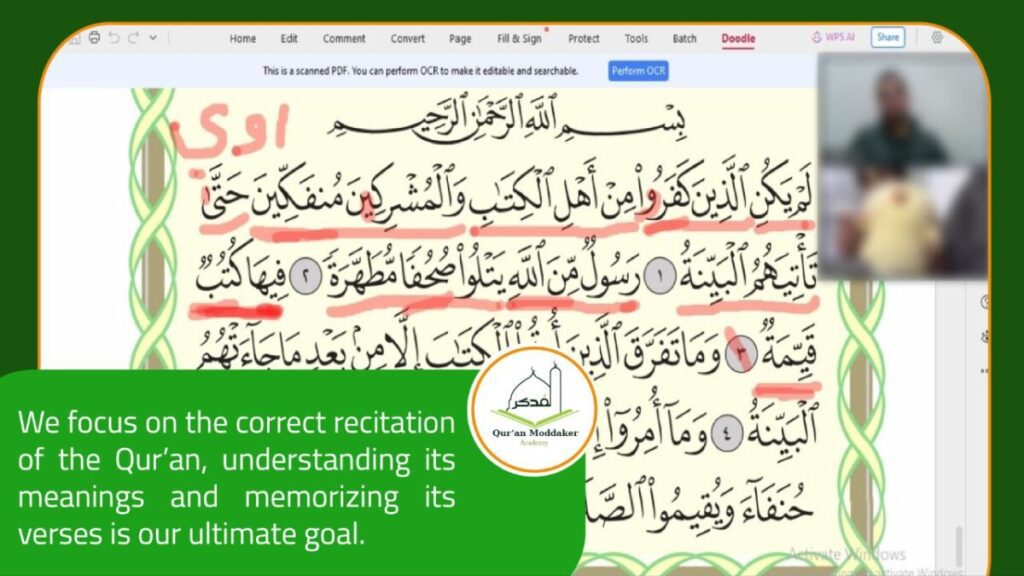
2. Offering a variety of learning options that cater to the needs of different learners.
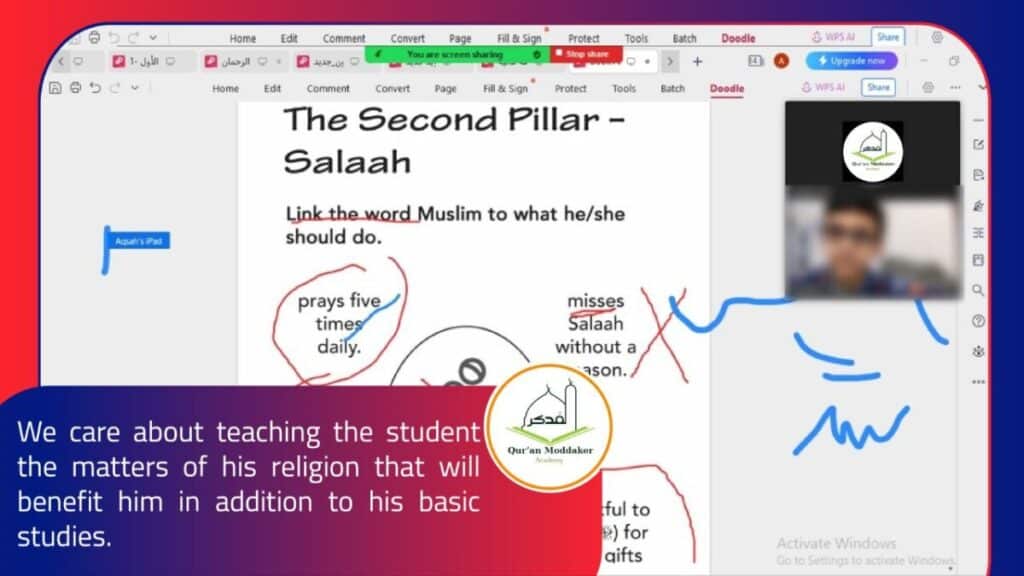
3. Creating a supportive and encouraging learning environment where everyone feels welcome and respected.
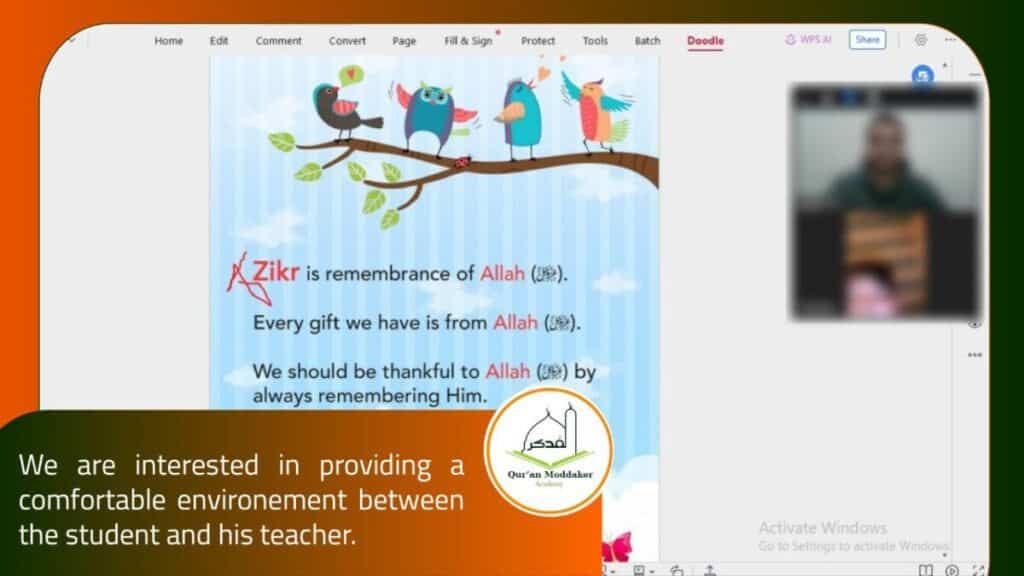
4. Two free trials.
5. Flexibility in choosing a suitable time.
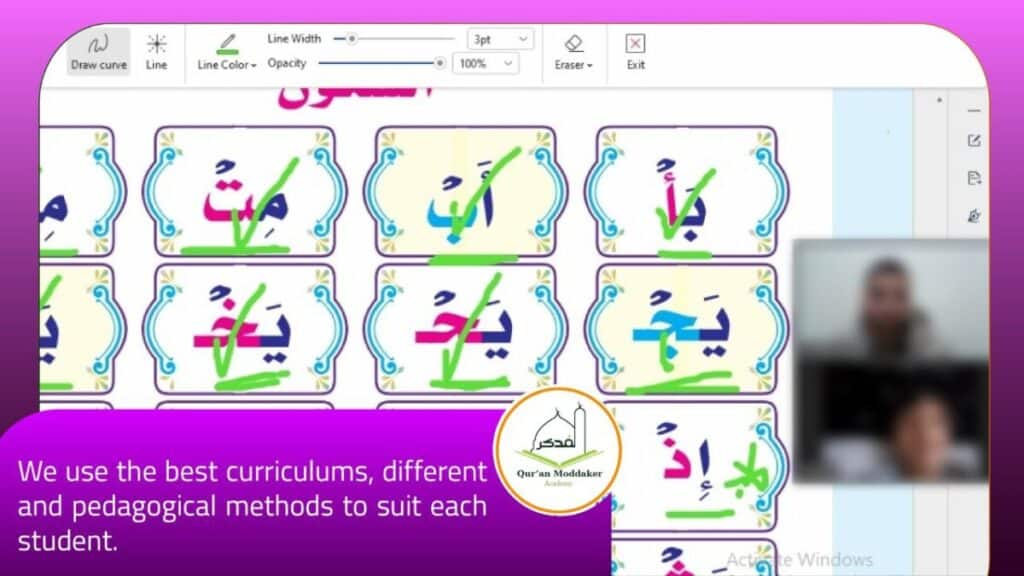
6. Qualified male and female teachers from Al-Azhar University.
8. Reminder notifications for class timings.
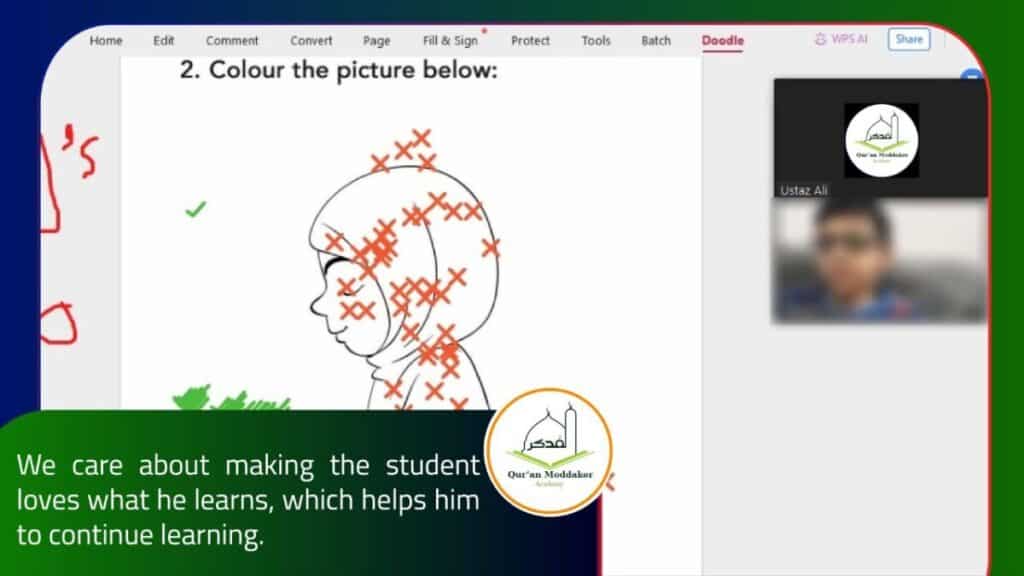
Finally, Quran Moddaker Academy offers the following courses for you:
1. Foundation Course: A comprehensive program designed for non-Arabic speakers who wish to learn how to read and recite the Quran with proper Tajweed. (here)

2. Quran Recitation: We provide Quranic recitation and Arabic language lessons for beginners to advanced learners, catering to both children and adults. (here)

3. Quran Memorization: Discover the treasures of the Quran through our comprehensive memorization course. (here)
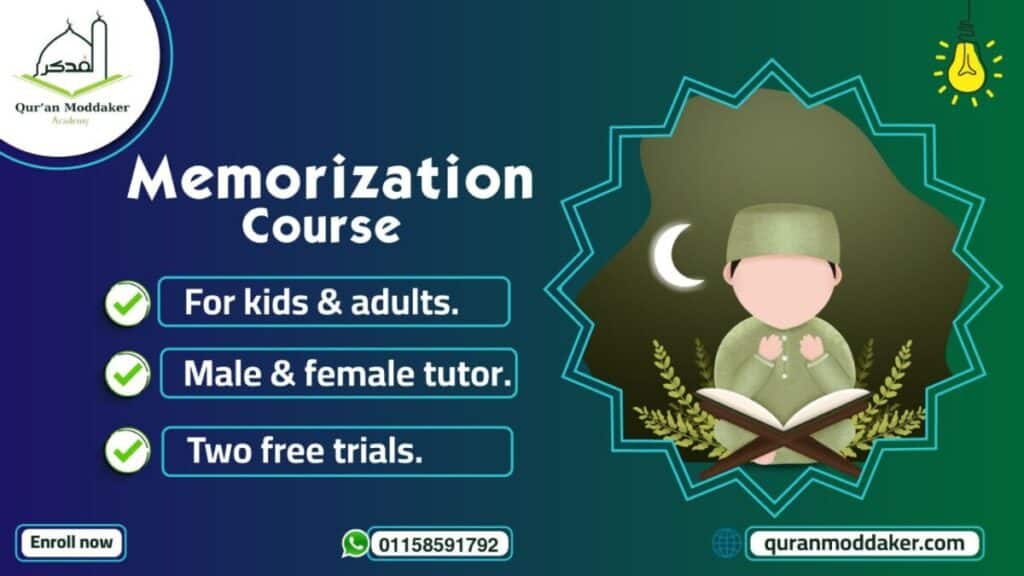
4. Tajweed Course: Specifically designed for individuals who want to deepen their understanding and practical application of Tajweed rules in their recitation of the Quran. (here)

5. Arabic Language Course: This course is designed to cover the four fundamental language skills: reading, writing, listening, and speaking, with equal emphasis on each component to ensure comprehensive language learning. (here)

6. Islamic Studies: Enroll in the Islamic Studies course at Quran Moddaker Academy and embark on a journey to deepen your understanding of Islam. (here)

7. Customized Training Course: Whether you’re a beginner or an advanced learner, we empower you to create a customized learning experience in Quranic studies and the Arabic language, tailored specifically for non-Arabic speakers. (here)

